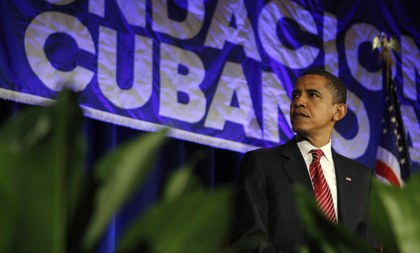
Over the past year, the Obama administration has repeatedly answered criticism of its lack of progress on Cuba with the excuse that Havana has not responded in kind to any overtures Washington has tried to make (it has the distinct feel of the classic “he started it” argument). In fact, recent statements by top officials have implied that the Castros deliberately thwart U.S. peacemaking efforts with the island every several years. Cuban officials respond, of course, that with the embargo still firmly in place, any small gestures that have been made are merely lessening the injustice of U.S. policy toward Cuba by tiny fractions that merit little appreciation and reaction from the Cuban side.
Then last week, a ray of light: Roman Catholic Cardinal Jaime Ortega and Archbishop Dionisio García in Cuba met with Cuban President Raúl Castro for four and a half hours to discuss the “national reality,” which apparently included the question of dissident prisoners. And when the meeting closed, the Church officials reported that Castro was “ready to act” on the issue. The meeting itself was rare, given the historic tension between the Cuban government and the Church; the topic was rarer, given the government’s defensiveness against recent international pressure regarding dissidents; and the result was rarest of all: a Church official reported that the Cuban government has now agreed to move many of the country’s 200 political prisoners to jails closer to their homes, and to give medical attention to some ailing prisoners.
The show of good faith has even been respectfully acknowledged by Guillermo Farinas, the Cuban dissident who has been on hunger strike for 89 days to protest prisoner treatment in Cuban jails. He has said that with a schedule from the government of when each ailing prisoner will receive treatment, he would feel comfortable ending his hunger strike.
Will Washington feel as positive about this humble development? It’s not the unconditional release of prisoners, which is what was requested, but it is, as Farinas points out, a show of good faith. Just like Obama’s gentle loosening of the knots of U.S. policy toward Cuba—it has not been the full scrapping of the embargo, as requested, but a show of good faith. Let’s hope the parallel is acknowledged; only then can further progress occur on both issues.
(Photo credit: AP/Chris Carlson)